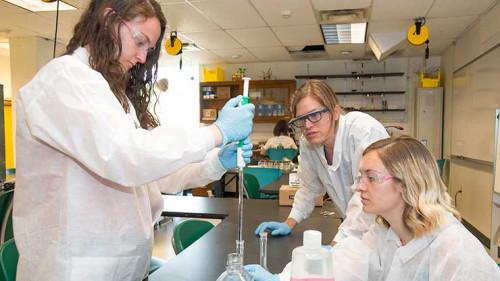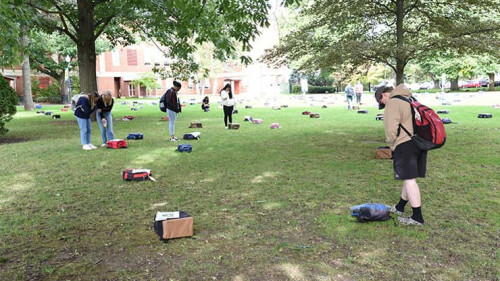
Siena College’s School of Science has added a High Performance Computing (HPC) Cluster that will enable faculty and students to conduct cutting-edge computational research in a variety of areas, including surface chemistry, biophysics and artificial intelligence. Purchased last month in collaboration with Siena’s Information and Technology Services, the HPC cluster has 480 GB of global memory, 20.5 TB of long-term storage and unlimited potential to provide students and faculty with opportunities to conduct important scientific research.
George Barnes, Ph.D., assistant professor of chemistry and biochemistry, spearheaded the effort to bring the 16-node machine to campus. Having a HPC cluster on campus, Barnes said, is beneficial because it gives him the ability to run his calculations in a timely fashion. Without it, his calculations would take more than a year and undergraduate involvement would be impossible.
“As a computational chemist, all of my research involves calculations and simulations and usually a fairly large number of them,” Barnes said. “My cluster allows for a great number of calculations to be performed in a short period of time. For example, in the past several days I have run (approximately) 20,000 simulations. If these had been performed on a single computer they would have taken nearly a year to complete.”
Barnes is researching how chemical reactions take place at a surface. He simulates very high energy collisions between gas phase peptides and self-assembled monolayers. Barnes said that because of the large amount of energy involved, some very interesting reactions can take place. “The great advantage of a computer simulation is that I can look at each individual step in these reactions. Without the significant reduction in calculation time possible from an HPC cluster, this particular type of computational chemistry would simply be impossible,” Barnes said.
The College’s HPC cluster will have a positive impact on student research as well. Students will receive time to run calculations in a low stress environment. They will be able to learn from mistakes and correct calculations throughout the research process, which would not be an option necessarily if they were using a national HPC cluster. “By having this local resource, our students will have the opportunity to learn how to use and work with a high performance computing environment. These are complex systems and can be very hard to use,” Barnes said. He added that the students are gaining valuable real world experience that will make them appealing as prospective graduate research assistants. The skills they learn will also be useful as they enter the workforce.



